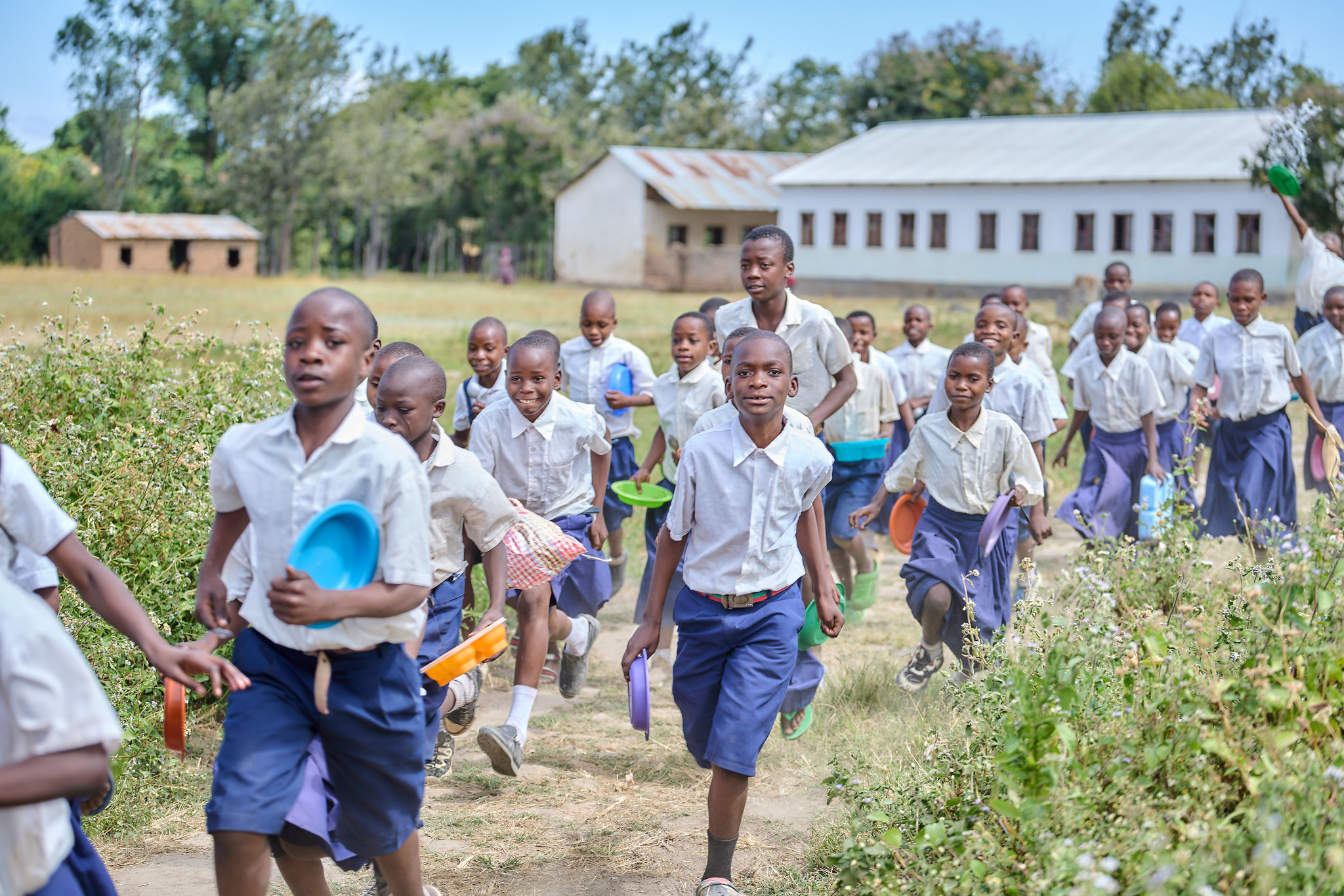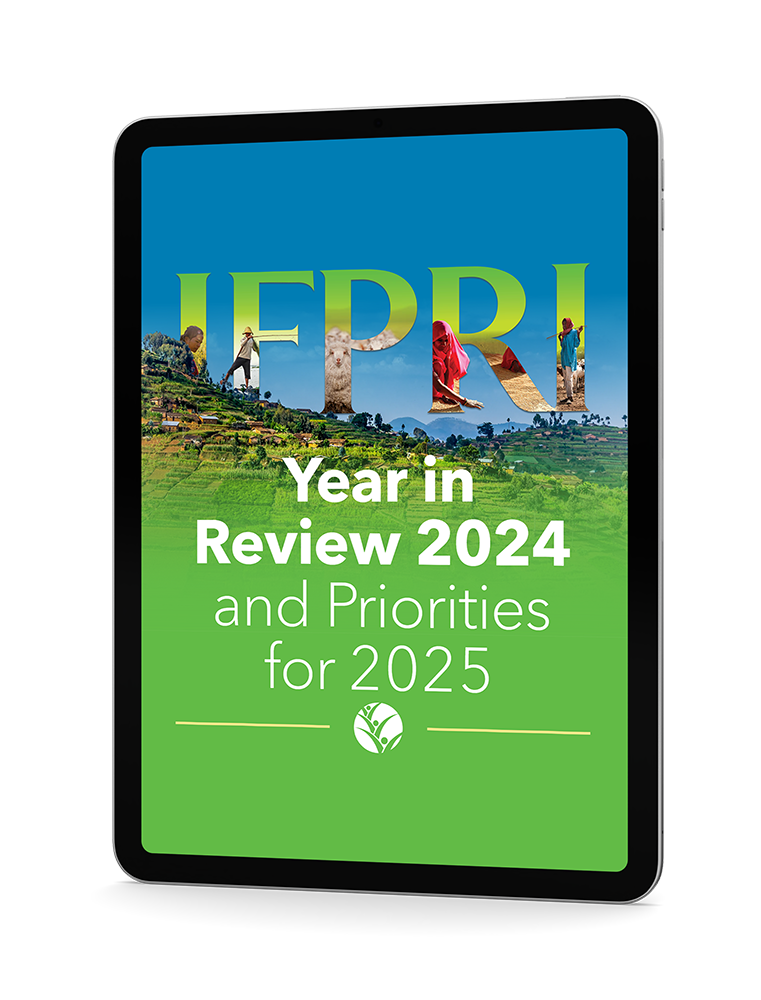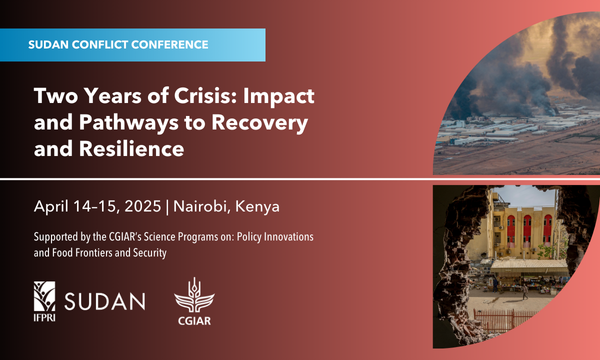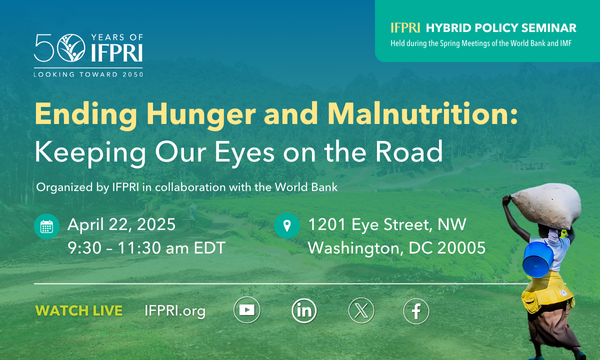What’s New
-
New study challenges the use of Growth Monitoring and Promotion to detect growth faltering in children
A new study published in Advances in Nutrition critically examines the effectiveness of Growth Monitoring and Promotion (GMP) in diagnosing or screening for inadequate growth in children.
-
Ecowas breakup could push up food prices and worsen hunger in west Africa (The Conversation)
The Conversation Africa published this op-ed by Danielle Resnick, IFPRI Senior Research Fellow, on the recent Economic Community of West African States (ECOWAS) breakup, or “Sahelexit,” and the implications for…
-
Solving global hunger: New report highlights school meal programs as drivers of change
School meal programs don’t just ensure children go to school and stay fed — they are a powerful force for change in communities and food systems worldwide. According to the…
Featured Publications
Journal Article
Governance and resilience as entry points for transforming food systems in the countdown to 2030
2025…more
Masuda, Yuta J.; McLaren, Rebecca; Saisana, Michaela; Aburto, Nancy; Ambikapathi, Ramya; Rodriguez, Mariana Arellano; Barquera, Simon; Battersby, Jane; Beal, Ty; Béné, Christophe; Cafiero, Carlo; Campeau, Christine; Caron, Patrick; Cattaneo, Cattaneo; Candel, Jeroen; Covic, Namukolo; del Pino Alvarez, Inmaculada; Barreto, Ana Paula Dominguez; Elouafi, Ismahane; Frazier, Tyler J.; Fremier, Alexander; Foley, Pat; Golden, Christopher D.; Fischer, Carlos Gonzalez; Guarin, Alejandro; Hendriks, Sheryl; Herforth, Anna; Honorati, Maddalena; Huang, Jikun; Getaneh, Yonas; Kennedy, Gina; Laar, Amos; Lal, Rattan; Lidder, Preetmoninder; Feye, Getachew Legese; Loken, Brent; Malapit, Hazel J.; Marshall, Quinn; Mulatu, Kalkidan A.; Munguia, Ana; Nordhagen, Stella; Resnick, Danielle; Suhardiman, Diana; Sumaila, U. Rashid; Sun, Bangyao; Mengesha, Belay Terefe; Cullen, Maximo Torero; Tubiello, Francesco N.; Dooren, Corné van; Morales, Isabel Valero; Vivero-Pol, Jose-Luis; Webb, Patrick; Wiebe, Keith D.; Haddad, Lawrence; Herrero, Mario; Moncayo, Jose Rosero; Fanzo, JessicaJournal Article
Diet quality and micronutrient intakes in nutritional value chains: A synthesis and suggestions for further research
2025Meenakshi, J.V.; Quisumbing, Agnes R.Journal Article
Impacts of city life on nutrition: Evidence From resettlement lotteries in China
2025Leng, Ganxiao; Qiu, Huanguang; Filipski, Mateusz
2024 Year in Review
Explore highlights from IFPRI’s 2024 research and outreach, including our work on food security and healthy diets, responding to conflicts and building resilience, and major outputs from our regional and country programs. Click through the interactive review to view videos, blogs, events and more.
IFPRI and CGIAR
IFPRI is a Research Center of CGIAR, the world’s largest global agricultural innovation network. IFPRI researchers collaborate closely with researchers from other CGIAR Centers, and our work contributes to the CGIAR mission of delivering science and innovation that advance the transformation of food, land, and water systems in a climate crisis.

Experts in Our Field
IFPRI’s experts work around the world to provide the evidence that supports effective policies to sustainably reduce poverty and end hunger and malnutrition.
600+
staff across the world
80+
countries where we work
#1
in the field of Agricultural Economics
20,000+
research outputs
Meet a Researcher
Mulubrhan Amare is a Senior Research Fellow with the Development Strategies and Governance Unit. His expertise lies in quantitative agricultural and development economics, with a specific focus on areas such as food and nutrition security, urbanization, agricultural transformation, and migration, and spans various focus areas, including impact evaluation, rural institutions, food system transformation, poverty and inequality, and conflict. Currently, his primary research efforts are directed towards food and nutrition security, conducting impact evaluations of agricultural technologies and development interventions, and…

From our video channel
Faces of IFPRI: Agnes Quisumbing
This video features Agnes Quisumbing, Senior Research Fellow. Agnes reflects on 30 years of policy research based on extensive fieldwork in Asia and Africa, the importance of working together to solve tough problems, and of learning from women and men’s lived experiences. She also shares her favorite IFPRI memory, and what keeps her passionate about her work.
“Faces of IFPRI” is a new series of interviews with IFPRI colleagues around the world, showcasing the diversity of talent, geographies, and research interests across the Institute.
Our Events

Making a Difference Blog Series
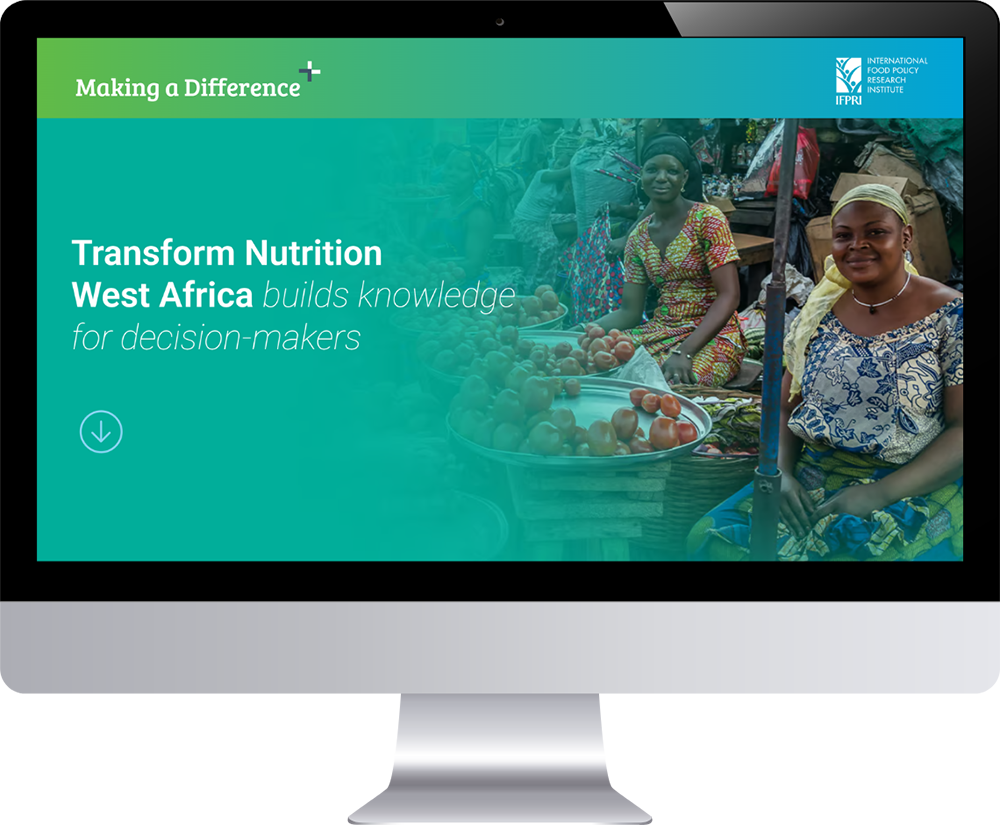
West Africa faces significant problems with various forms of malnutrition, especially among women and children. In 2017, the region had the highest rate of under-five wasting (low weight-for-age) in Africa—8.5% compared with the continent’s mean of 7.4%. The rate of stunting (low height-for-age) waw also extremely high at 31.4%. In 2017, 52% of women ages 15-46 suffered from anemia.
In response, IFPRI, with funding from the Gates Foundation, established Transform Nutrition West Africa (TNWA)—a regional knowledge platform to facilitate effective policy and action on maternal, infant, and young child nutrition in West Africa with a focus on four countries: Burkina Faso, Ghana, Nigeria, and Senegal. TNWA ran from 2017 to 2021.
Tamsin Zandstra, Roos Verstraeten, Ampa Dogui Diatta, Loty Diop, and Mariama Touré explore TNWA’s research, work, and long-term impact in West Africa.







